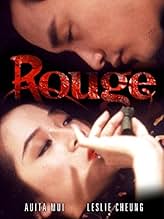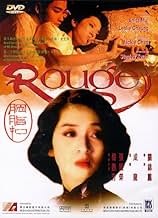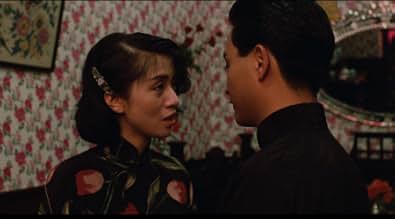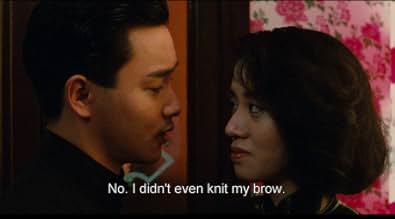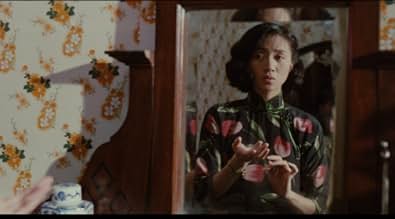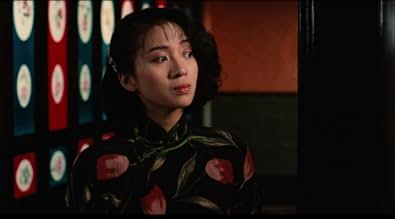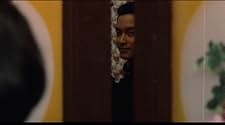Fleur is the blue angel in one of Hong Kong's "flower houses" - bordellos and night clubs of the 1930s. A detached and beautiful performer, she falls in love with Twelfth Master Chan, heir t... Read allFleur is the blue angel in one of Hong Kong's "flower houses" - bordellos and night clubs of the 1930s. A detached and beautiful performer, she falls in love with Twelfth Master Chan, heir to a chain of pharmacies. They agree to a suicide pact. 50 years later, in modern Hong Kong... Read allFleur is the blue angel in one of Hong Kong's "flower houses" - bordellos and night clubs of the 1930s. A detached and beautiful performer, she falls in love with Twelfth Master Chan, heir to a chain of pharmacies. They agree to a suicide pact. 50 years later, in modern Hong Kong, Fleur's ghost appears in Yuen's newspaper office, wanting to place an ad to find Chan, w... Read all
- Awards
- 12 wins & 9 nominations total
- Chen-Pang's Mother
- (as Sin Hung Tam)
- Movie Director
- (as Chia-Yung Liu)
- Actress Portraying Ghost
- (as Kara Wai)
- Director
- Writers
- All cast & crew
- Production, box office & more at IMDbPro
Featured reviews
Haunting and hypnotic, a beautifully understated classic
"Rouge" tells the story of two doomed lovers in the early 1930's. He is a high class gentleman, Twelfth Master Chan Chen-Pang, the heir to three successful medicine stores. She is Fleur, a famous courtesan. His parents disapprove of both his choice of lover and also his passion for the Cantonese opera. They are horrified when he decides to give up the shopkeeping business in favour of becoming an actor and immediately order him to return to the family. So he and Fleur take their own lives, vowing to meet up in the afterlife and be together forever. Fifty years later, her ghost returns to the world of the living, still searching for her beloved Twelfth Master.
On the surface, it's a traditional Chinese romantic ghost story but there's far more lurking underneath. Essentially "Rouge" is a lament on a bygone age of pre-Westernised China, a yearning for a return to the old values, traditions and passions that are now lost beneath the neon lights and soulless rush of modern-day Hong Kong. It's also a lonesome mediation on the nature of trust and the complexity of human relationships with a tragic punchline and a strong sense of alienation running throughout.
Deeply melancholy, loaded with ravishingly beautiful imagery and haunting performances from the two gifted leads (Anita Mui and the ever-mesmerising Lesley Cheung), "Rouge" is an unforgettable, understated and utterly unique piece of filmmaking. A very strange, subtle blend of genres that floats around the mind long after the end credits have finished rolling. 9 out of 10.
promise
Hongkong film industry reached the peak in late 80s, and this movie is one of the best produced that time. In it we can find very good actors and director, very beautiful cinematography, and a thoughtful story of course.
Silent and slow but not boring. A must see.
for Anita Mui and Leslie Cheung fans
This complicated love story is now made more poignant by the real life fact that both actors died young, in 2003 - Cheung by suicide and Mui by cancer. Recommended for romantics, film buffs, and devotees of Cheung and Mui.
Rouge
If you love ghost stories, love stories, Hong Kong and Chinese music, this movie has all that. It was a pleasant surprise to find a film that told a familiar story so beautifully it becomes unique.
Leslie Cheung and Anita Mui were perfect for their roles. Watch out for the scene where Leslie wears Peking Opera makeup. Fans of "Farewell, My Concubine" will surely love the foreshadowing of Leslie's future internationally-acclaimed performance.
Does love really last forever?
Did you know
- TriviaActress Anita Mui personally recommended Leslie Cheung to cast this film.
- ConnectionsFeatured in Century of Cinema: Naamsaang-neuiseung (1996)
- SoundtracksYan Zhi Kou
Performed by Anita Mui
- How long is Rouge?Powered by Alexa


